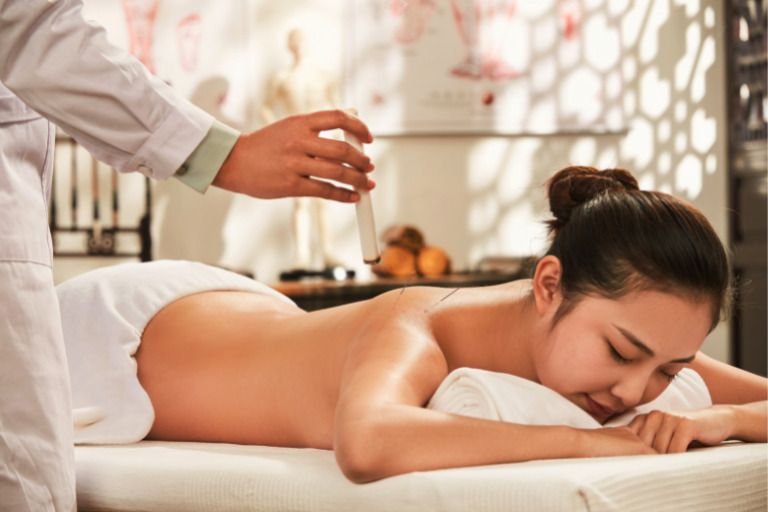
The ancient practice of acupuncture dates back approximately 3000 years ago. Its first documented use was in China, where it was mentioned in The Yellow Emperor’s Classic of Internal Medicine. Shortly afterwards, it became a well-established key foundation of Traditional Chinese Medicine (TCM), together with massage, herbs and diet.
But what does acupuncture do? And is TCM a proven effective technique against aches, pains and other medical conditions? We dissect everything you need to know about this age-old tradition.
What is Acupuncture?
Acupuncture is rooted in the hypothesis that disease is caused by interruptions to the flow of energy (or qui – ‘chee’) within the body. The practice uses tiny needles to stimulate points located under the skin (acupuncture and acupressure points), which releases the chee. The chee energy then travels across meridians, the body’s energy highways.
Western society has been trying to understand exactly how acupuncture manifests results for patients: one school of thought is that the practice works by transmitting signals from specific nerves to the brain. As a result, the brain releases well-being chemicals like endorphins, increasing their pain threshold. It’s also thought that acupuncture could reduce the body’s inflammatory response by increasing energy and the immune system.
Whilst there is no definitive answer (yet), research points at these two theories holding water, and there is plenty of evidence to prove that it does make a difference to certain conditions, aches, and pains.
Many people are becoming more attracted to practices like Chinese medicine, acupuncture, and Chinese herbal medicine to move away from pill taking and more clinical pain relief. The NHS (and many private dental practices) readily use acupuncture as a method of pain relief in some pain clinics and hospices, proving it has a space within Western medicine, not just out in the East, where it was first conceived.
What Does Acupuncture Treat?
Acupuncture is versatile, relieving acute and chronic pain, such as back pain, headaches, osteoporosis, knee pain, neck pain and lower back pain. Some studies have suggested that acupuncture could benefit migraines, nausea, and rheumatoid arthritis, though there isn’t enough evidence to confirm this.
Acupuncture benefits include:
- It can be safely combined with other pain relief.
- Chronic pain can be controlled.
- The risk of side effects is low.
- Works to treat multiple conditions simultaneously.
What Is Chinese Herbal Medicine?
Chinese Herbal Medicine is another pillar of TCM, often combined with acupuncture. The concept underpinning Chinese herbal medicine (which has changed very little since its beginnings 3000 years ago) is the idea of treating patterns and patients instead of diseases. The tailored combination of herbal formulas aims to create a network within the body that will not become hospitable for disease. It is prescribed to restore the energy balance of the Yin and Yang prevalent within invisible channels in the body.
To use Chinese herbal medicine traditionally, you must visit a herbalist’s shop or a clinic specialising in the practices of TCM. Based on your needs, you will be given a mixture of dried herbs, which are boiled in hot water and then consumed. In recent years, herbal formulas are available in tablet or powder form, making it more accessible for those who wish to reap the benefits (not everyone’s anatomy agrees with pills and pill-swallowing), which incidentally brings us to discussing just that….
How Effective Is Chinese Herbal Medicine?
Just like pharmaceutical drugs, herbal-based formulas can have a powerful effect on the body. Therefore, dosages must be respected and followed as stipulated by your doctor /qualified herbalist. It’s difficult to ascertain the efficacy of Chinese Herbal Remedies since studies have been limited and not comprehensive enough – it does not have the same status as acupuncture in the Western world. However, there is certainly something to be said for treating chronic pain and conditions related to fatigue like fibromyalgia and POTS disease with herbal medicine, with pharmaceutical medicine still being a fair way off with understanding these.
The Takeaway
When thinking about and evaluating Traditional Chinese Medicine, the keyword is ‘holistic’. There is indeed proof underpinning the value of acupuncture, though with strands of TCM like herbal-based methods, it’s still not fully proven that it works to treat conditions, or at least not as a standalone treatment.
Are you looking for acupuncture in London? Look for a reputable clinic headed up by a TCM expert with experience working in China and the U.K.


